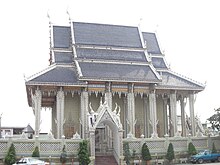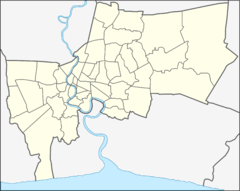| Wat Sai | |
|---|---|
| Wat Sai | |
 The modern ubosot The modern ubosot | |
| Religion | |
| Affiliation | Buddhism |
| Sect | Theravāda Mahā Nikāya |
| Status | Civil temple |
| Location | |
| Location | 11 Soi Ekkachai 23, Ekkachai rd, Bang Khun Thian, Chom Thong, Bangkok 10150 |
| Country | Thailand |
 | |
| Geographic coordinates | 13°41′25″N 100°27′27″E / 13.69034°N 100.457632°E / 13.69034; 100.457632 |
| Architecture | |
| Completed | 1703 |
Wat Sai (Thai: วัดไทร, formerly spelled วัดไซ, pronounced [wát sāj]) is an old Buddhist temple in Bangkok.
History
It was created in 1703 during the Ayutthaya period, but the name of the founder is not known. It belongs to the Mahā Nikāya branch of Buddhism.
In 1708, the temple received the Wisungkhamsima and was officially promoted as a community place of worship.
Highlights
Wat Sai is considered one of the famed temples in the Chom Thong area, along with nearby Wat Nang Nong and Wat Ratchaorot.
There are many interesting Buddha images housed inside vihara (sanctuary).
Another interesting attraction is Tamnak Thong (ตำหนักทอง, "gold painted mansion"), kindly dedicated by King Sanphet VIII. The 29th king of Ayutthaya, more commonly known as Phra Chao Suea (พระเจ้าเสือ, "tiger king"). As the name implies, the wooden house was decorated with gold painting on black resin lacquer and some parts were probably cover with gold leaves. There is also an old ubosot (ordination hall) built in the Ayutthaya style and it has been maintained in its original style.
Adjacent to the old ubosot that was built with ceramics in Rattanakosin style. Combination of splendors between two styles of equally spectacular arts from two different periods.
Wat Sai floating market
Beside the temple next to the canal Khlong Dan, is the location of Wat Sai floating market. It was once a busy and lively floating market where farmers came and sold products on boat. It was known as the greatest and most famous floating market of the era in the central region. In late 1964, King Bhumibol Adulyadej (Rama IX) took the Japanese crown prince Akihito (later Emperor Akihito) and his wife princess Michiko, to visit this floating market as well.
Wat Sai floating market gradually became less active around 1977, and today, the status of a floating market has completely disappeared. It had become nothing more than a bustling morning land market. The only evidence of its glorious past is a wooden nameplate hangs above the market entrance.
Gallery
-
Tamnak Thong of King Sanphet VIII
-
 Inside the Tamnak Thong
Inside the Tamnak Thong
-
 King Sanphet VIII statue
King Sanphet VIII statue
-
 Nameplate of Wat Sai floating market
Nameplate of Wat Sai floating market
-
 Principle Buddha image
Principle Buddha image
-
The old ubosot is in front of the modern ubosot
Notes
- Although most believe that it was the place where King Sanphet VIII stayed while on a fishing trip in the Ayutthaya period. But from the study of expert archaeologists, it was found that it was a building with architecture from the Rattanakosin period. However, it did not change the fact that it was related to King Sanphet VIII in any way.
References
- ^ Num-suthon (2020-11-22). "ชวนเที่ยวจอมทอง-บางขุนเทียน "วัดไทร" กรุงเทพฯ". TrueID (in Thai). Retrieved 2023-12-01.
- ^ "เยือน "วัดไทร" (จอมทอง) ชมโบสถ์ 2 สมัย อิ่มใจไหว้ศาลพระเจ้าเสือ". ASTV Manager (in Thai). 2018-05-18. Retrieved 2023-11-30.
- ^ Matichon TV (2019-02-24). "ย่านข้าหลวงเดิม บางขุนเทียน เส้นทางคลองสายประวัติศาสตร์ :ทอดน่องท่องเที่ยว". YouTube (in Thai). Retrieved 2023-11-30.
- Wongthes, Sujit (2018-07-12). "ตำหนักทอง วัดไทร บนเส้นทางประวัติศาสตร์". Matichon (in Thai). Retrieved 2023-11-30.
- ^ Navikamul, Anek (2023-01-22). "ตลาดน้ำวัดไทร ถึงตลาดน้ำวัดจอมทอง ที่เที่ยวดังยุคก่อนและการเปลี่ยนโฉมเพราะรถไฟชนกัน!". Art & Culture (in Thai). Retrieved 2023-11-30.
- Richie on the way (2023-07-09). "ตลาดน้ำวัดไทร ปัจจุบัน!! ว่างมั้ย!?..ที่นี่มีแต่ของน่ากิน". YouTube (in Thai). Retrieved 2023-11-30.